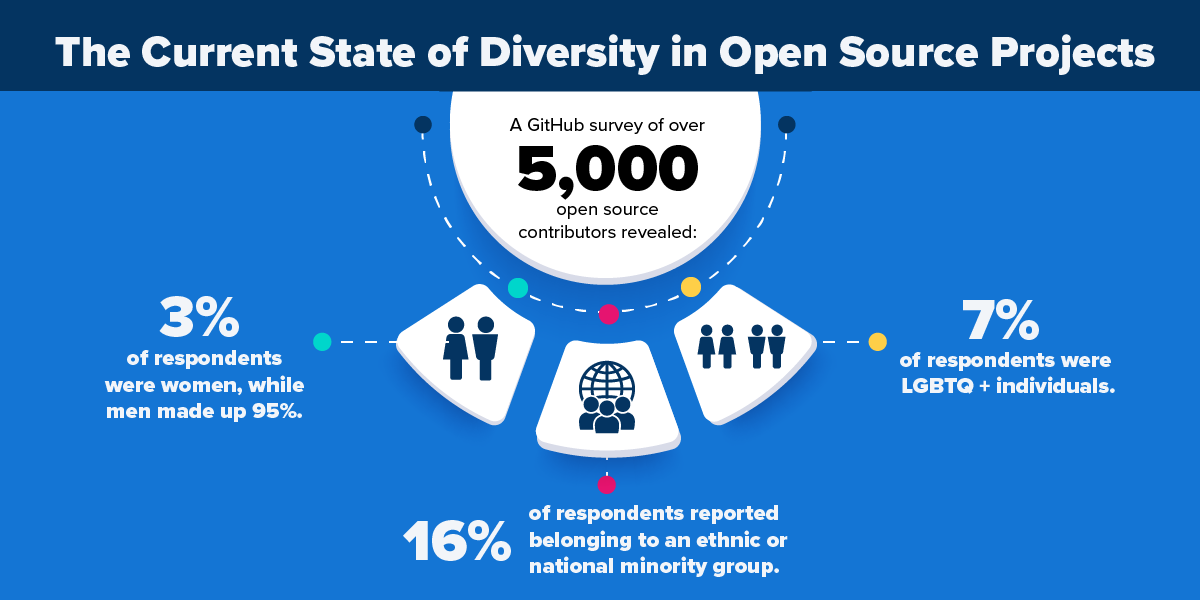Free Resources for Improving Diversity In Open Source STEM Projects

In open source projects, different voices converge to share ideas, exchange knowledge, and solve problems, giving new and current web developers the opportunity to gain skills, enhance their portfolios, and learn from one another through collaboration. However, many open source communities have an ongoing diversity issue, as evidenced by the results of a 2017 global GitHub survey, below.

Fortunately, open source communities are beginning to recognize the need for new initiatives to tackle the lack of diversity in their projects. In fact, a recent article by The Next Web claims that 2021 will be the year open source projects overcome their diversity problems.
In order for that to happen, these communities will need the proper resources to address injustice and inequality and then create an inclusive environment where people from different backgrounds are able to collaborate. The free resources provided in this article are designed to help members of underrepresented groups contribute more freely, even in the face of inequitable access. But first, we will examine what may be holding them back.
Factors That Affect Diversity in STEM
In order to encourage diversity in open source STEM projects, it is important to look at what prevents individuals in minority groups from participating. Here are some factors that may explain the imbalance.
- Gender Bias: According to research conducted by the American Association of University Women, many people assume that STEM fields are dominated by men, whereas arts and humanities are dominated by women. The stereotype that STEM is a male discipline may be causing women to shy away from working on open source projects or even entering the field altogether.
- Hidden Bigotry: Open source platforms like GitHub connect 27 million developers, who are able to find and share code for almost anything. However, some bloggers and articles have reported finding code containing extremely offensive racist, sexist, and homophobic language. Additionally, open source projects commonly use terms like “master” (referring to the main version of code) which has been widely interpreted as racially insensitive. Fortunately, GitHub recently began removing the terms from their platform.
- Imposter Syndrome: Another problem for contributors is the fear of expressing their opinions in the open source community, says Lin Sun, a former technical lead at IBM. “The community is [mostly] male, and what if you don’t get any ‘+1s’ because your ideas are different?” says Sun. In turn, this may discourage contributions from women and newcomers alike.
Why Diversity in STEM Is Important
When people from different disciplines and backgrounds collaborate, innovation occurs, says IBM. This is consistent with a study conducted at the University of Michigan, which found that diverse groups of problem solvers perform better than homogenous groups of high-ability problem solvers. These findings are further supported by the World Economic Forum in a recent article on the impact of diversity on team performance.
As open source becomes more mainstream, unique perspectives and experiences will be essential to accelerating innovation. In order for open source to be truly open, everyone in the community — and those interested in joining — must feel welcome, says TODO Group. Contribution must be possible for all regardless of gender, gender identity, sexual orientation, ability, race, ethnicity, age, religion, educational background, political position, or economic status.
Free Resources for Improving Diversity in Open Source STEM Projects
Jump to resources on:
- Creating an inclusive open source space
- Inclusive and diverse open source projects, repositories and resources for the LGBTQ+ community, Black coders, women
- Open source funding opportunities for underrepresented groups
- Hackathon opportunities for underrepresented groups
How to Create an Inclusive Open Source Space + Set Up a Code of Conduct
- An Open Source Etiquette Guidebook — This article contains a bulleted list of open source etiquette suggestions to help you have a positive experience in the community.
- Five Tips For Creating a Welcoming and Inclusive Open Source Space — Here is a list of tips that every open source project manager should consider.
- Building an Inclusive Open Source Community | Tips — These tips are designed to help build an inclusive open source community.
- 8 Resources to Use to Ensure You’re Using Inclusive Language — HubSpot shares a list of resources to help ensure you’re using inclusive language.
- Why Do I Need a Code of Conduct? + How to Set One Up — This article explains why a code of conduct is important and how you can set one up.
- Leadership Training Series | How to Write or Choose a Code of Conduct — This resource can help you maintain a diverse, welcoming community.
- 12 Ways For Open Source Projects to Support Diversity — The following list provides 12 suggestions for open source projects that support diversity and inclusion.
- Mozilla’s GitHub Repository for Diversity, Equity, and Inclusion — This repository includes a list of resources dedicated to diversity, equity, and inclusion.
- How to Apply Metrics for Inclusion to Your Open Source Project — This article discusses how you can implement metrics for inclusion within open source projects.
- How To Increase Diversity & Inclusion In Open Source & Become Better Allies — This article presents tips for building a more diverse open source community and becoming a stronger ally.
- Anti Racism Reading List | GitHub – This GitHub directory contains reading materials that you can use to better understand issues around racial justice within technology.
Open Source Projects, Repositories, and Resources for Underrepresented Groups
Resources for the LGBTQ+ community
- LGBTQ of the Day Bot — This Twitter bot tweets uplifting LGBTQ content and queer history every day.
- Watch Face Pride — Developers can collaborate and share Apple Watch faces designed in support of pride.
- LGBTQ Technology Resources — This GitHub directory has curated a list of LGBTQ+ individuals working in technology.
- Pride Flag API — This API lists data about various LGBTQA+ Pride flags, delivered as JSON by REST or GraphQL.
- Pride Archive — This GitHub directory contains snapshots of companies supporting LGBT+ Pride Month.
- Gay Bingo — Gay developers are able to play a fun and interactive game of bingo designed expressly around their unique experiences.
- LGBT Friendly Discord Bot — This is an LGBT-friendly Discord bot made using Discord.Net. The bot’s personality is loosely styled after the creator’s cat, Lefty.
- PrideMap — Here is a series of LGBTQ+ Pride flag-inspired MATLAB color maps created in celebration of LGBTQ STEM Day.
Resources for Black coders
- Blacktocats — Blacktocats is the first official GitHub Community of Belonging. Their mission is to attract and empower Black lives in tech.
- Awesome Black Developers — This directory is designed to amplify the voices of Black developers in open source.
- Developer Tools for #BlackLivesMatter — This directory offers a running list of developer tools and companies supporting Black Lives Matter.
- COCO-Africa — Here is a curation tool to build data sets of common objects in the context of Africa.
- Coding Black Females — The official GitHub for Coding Black Females, a nonprofit aiming to provide opportunities for Black female developers.
- Made in Africa — Here is a snapshot of local projects across the continent of Africa.
- Black Lives Matter and Social Justice — This project focuses on the Black Lives Matter movement through a statistical analysis on the treatment of African Americans and other racial minorities.
Resources for women
- Awesome4Girls — This directory shares a curated list of inclusive events, projects, and initiatives for women in the tech space.
- React Ladies — Here is a group of women and non-binary ReactJS enthusiasts in New York City (and beyond)
- Women Made It — This resource shares design and development tools, books, podcasts, and blogs made by women.
- She’s Coding — The official GitHub for She’s Coding, a movement devoted to helping women and non-binary individuals get into tech.
- Women World Wide — Women World Wide is a map of coding and tech groups around the world for all who identify as women.
- Code By Women — This directory offers a running list of programming blogs headed by women.
- SheHeroes — Developers can use this directory to collaborate on SheHeroes, a safety app for women and children.
- PyLadies — PyLadies is a global mentorship group focused on helping women become active participants and leads in the Python open source community.
Open Source Funding Opportunities for Underrepresented Groups
- IBM Open Source Community Grant — IBM has created an Open Source Community Grant for its commitment to providing paid internships to underserved and individuals from underrepresented groups.
- Open Collective — Open Collective lets users manage finances so everyone can see where the money comes from and where it goes.
- Gitcoin — This resource connects the communities developing digital public goods, creating financial freedom, and defining the future of the open web.
- IssueHunt — This is the issue-based bounty platform for open source projects. Contributors can get financial support from IssueHunt and their community sponsors.
- Mozilla Open Source Support (MOSS) — MOSS awards program recognizes, celebrates, and supports open source projects that contribute to Mozilla’s work and to the general wellbeing of the Internet.
- NGI Assure Fund — The goal of this fund is to support projects that design and engineer reusable building blocks for the next-generation internet.
- Small Development Grants — These grants allow projects to fund important activities they wouldn’t otherwise be able to do like improving usability, growing project communities, and more initiatives.
- Funding Open Source Projects — This blog talks about funding open source projects while sharing helpful resources.
- The Python Software Foundation — The Python Software Foundation offers a grants program designed to support the Python community.
Hackathon Opportunities for Underrepresented Groups
- Spectra — Spectra hosts events where people from diverse backgrounds can join and attend to share a passion for technology.
- HackOut — According to their site, HackOut is the world’s largest LGBTQIA-themed entrepreneurship weekend.
- Black Googler Network Hackathon — Google is fueling inclusion through a hackathon hosted by the Black Googler Network (BGN).
- The Master List: Hackathons for Women in Technology — This list is a comprehensive look at upcoming all-female hackathons open for participation, sponsorship, volunteering, or mentorship.
- Trans*H4CK — This organization is committed to bringing visibility to trans tech innovators and entrepreneurs.
The inclusion of these resources is for educational purposes only and does not constitute an endorsement by Columbia Engineering Boot Camps or Columbia Engineering.

 Live Chat
Live Chat